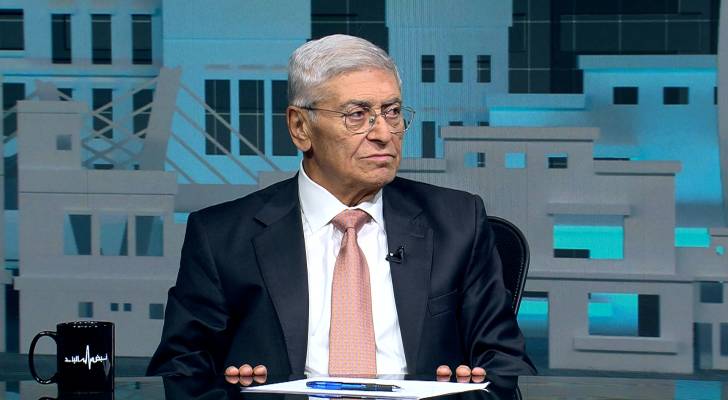Michael Sayegh, Chairman of the board of directors of Al-Sayegh Group.
Michael Sayegh calls for ethical campaigning by parties as elections approaches
Michael Sayegh, Chairman of the Sayegh Group, emphasized that the tragedy unfolding in Palestine, whether in Gaza or the West Bank, should not be exploited to garner sympathy by certain political parties as the parliamentary elections on September 10 approach.
Speaking on "Nabd AlBalad" program on Roya TV, Al-Sayegh stated that the Palestinian cause is not something to be manipulated by anyone. He stressed that the Jordanian-Palestinian Arab citizen is fully aware that this is a national cause shared by all and that no one can outbid others in their commitment to Palestine.
He pointed out that all election candidates share the same level of dedication and support, particularly since the Palestinian cause is Jordan's foremost issue, and all Jordanians are united in their support for it.
Al-Sayegh highlighted that the frustration Jordanians feel due to the situation in the occupied territories should not deter them from participating in the parliamentary elections. He noted that Palestinians have long paid a high price for their cause, and while liberation requires sacrifice, the crucial point is to continue supporting them.
He explained that the constitutional process began with His Majesty the King establishing the Royal Committee to Modernize the Political System, reflecting the King's vision to enhance democracy in Jordan by fostering political life and revitalizing political parties to participate in the parliament as national blocs.
Al-Sayegh underscored the importance of participating in the elections, noting that in previous elections, there was widespread apathy among citizens, leading to complaints about what MPs had achieved. He described abstention from voting as a "lack of citizenship," emphasizing that the nation's fate, along with its legislation, laws, and systems, starts with the ballot box.
Regarding the role of political parties in promoting election participation, Al-Sayegh said the parties and the Independent Election Commission (IEC) had fulfilled their roles effectively, leading to a significant increase in interest in political parties. He predicted that the upcoming elections would see a high turnout, thanks to the efforts of the parties and other electoral lists.
"On a personal level, we invited large numbers of people to explain the electoral law, and the head of the Independent Election Commission, Eng. Musa Maaytah, provided a comprehensive explanation. I believe that many similar gatherings took place, and the churches showed great interest in encouraging their members, especially as there are 132,000 Christian voters across the Kingdom, a significant number whom we strongly encourage to participate in the elections," Al-Sayegh added.
He noted that elite groups—political, economic, and social—have different interests but play a significant role in encouraging election participation.
"Unfortunately, I find that the most important elite, the economic one, is the least engaged in promoting election participation. Even when we asked them for financial support for the parties, they showed little interest," he said.
Al-Sayegh pointed out that professional associations, such as those for engineers and doctors, are actively raising awareness about election participation, a change from the past, as people now feel that the elections could be conducted smoothly and serve the citizens in the future by electing a larger number of non-traditional MPs with programs and ideas.
"Everyone thinks that, through their social or economic status, they can solve their problems, but today, it's about national issues. Industries, agriculture, and other sectors need fundamental solutions through ministers and legislation that come from the parliament. The economic elite in Jordan is limited, and its role today should be to encourage their families and employees to participate in the elections," he said.
Al-Sayegh called for the establishment of a center to manage the current stable economic situation, which should grow rapidly. He stressed the need to rely on experts and MPs with economic orientations, not just those who are aware of citizens' problems like poverty and unemployment, to make a difference. He noted that MPs with strong programs can coordinate and form blocs within the parliament to make decisions impacting all sectors affecting the economy.
On the issue of origins and backgrounds, Al-Sayegh stated that previous parliaments, which were all based on regional lists, left those of different origins feeling underrepresented, leading to their reluctance to participate in elections. He noted that the electoral law has taken these concerns into account.
"We need one or two more election cycles to achieve significant awareness and a substantial role for parties in parliament. It's well known that party members will make up a large part of the lists, so the concept of 'origins and backgrounds' is no longer relevant as it once was," Al-Sayegh said.
He expressed optimism about moving towards a parliamentary government and realizing His Majesty the King's vision within the timeframe set by the King.
Al-Sayegh praised the media for playing a vital role in raising awareness and encouraging participation in the upcoming elections.
"I have personally taken on the task of supporting the elections in every way possible, starting with the establishment of the Civil Democratic Party, which aims to create a political class of young people who can think freely and independently and advocate for a civil state. Jordan is a civil state, and its constitution guarantees equal rights for all citizens, but there are instances where equality is lacking. That's why these parties were founded—to advocate for change and equal rights for citizens. I strongly support the democratic movement because it is youth-driven and rooted in the vision of a civil state where citizens' rights and duties are equal," he concluded.




